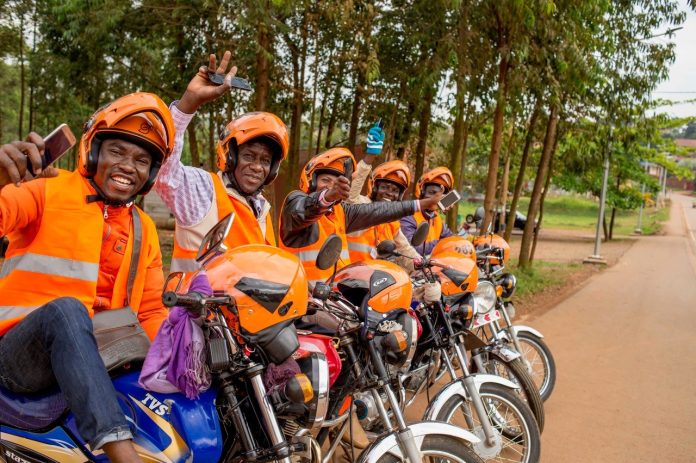SafeBoda, a popular ride-hailing platform founded in East Africa has launched in Ibadan, Nigeria, a year after it launched in Nairobi, Kenya, making Nigeria its third African market after it went live in Uganda four years ago.
SafeBoda, founded in November 2014 in Kampala by Alastair Sussock, Ricky Thompson, Maxime Dieudonne and Clarisse Iribagiza will compete with Nigeria’s Max, GoKada, ORide, among others in Africa’s biggest consumer market.
Available on both Android or iOS apps, SafeBoda allows users to hail SafeBoda drivers to pick up passengers or courier via smartphone apps securely. The firm says it has vetted and trained its drivers to provide a safe and secure means of transport to people’s homes and places of work in a move to help reduce road accidents, curb casualties, deaths, and the costs of footing expensive hospital bills.
Starting in Kampala, SafeBoda is looking to bring sanity to roads in Africa then India by training riders who are increasingly becoming more and more unpopular on our roads in several cities in Africa. The launch in Nigeria was its next natural move for its pan-African expansion.
SafeBoda trains the riders on road safety, bike repair and maintenance, basic first aid and customer service. SafeBoda gives its riders two helmets for both the passenger and rider and a reflective jacket embedded with the rider’s name for safety of the passengers.
Happy New Month Nigeria, your SafeBoda is here pic.twitter.com/zUKDtOSllY
— SafeBoda Nigeria (@SafeBoda_NGA) December 1, 2019
The launch in Nigeria has taken longer than expected because the firm needed to hire, understand the market, and sign up riders. There are reports too that the firm struggled with what model to go with as normally, in East Africa riders sign up with their own motorcycles while it needed to own a fleet in the Nigerian market and then lease them out to riders on a lease-to-own model.
The lease-to-own model is costly, unlike the aggregator model which the firm has long used in East Africa. The aggregator model is simpler and it requires less capital compared to the lease-to-own model which is more capital intensive and time-consuming even though it gives the company more control.
Seven months ago, SafeBoda raised funding and said it will be venturing heavily into mobile payments and insurance. The funding was to help the firm with its expansion in East Africa and across the continent and probably outside the continent as SafeBoda has plans to expand to India and into emerging markets.
“Our investment in SafeBoda underlines our continued commitment to growth markets. We are excited to participate in the development of ride-hailing ecosystems in Africa,” said Oliver Ullrich, Corporate Development Director at Allianz X. “SafeBoda has successfully established itself in the ride-hailing market in Uganda and we look forward to supporting the company’s expansion into additional countries and services.”
Allianz intends to leverage its regional presence and capabilities, working with SafeBoda to transform transportation, logistics, and payment sectors in Africa, starting in Kampala, Uganda and Nairobi, Kenya.
“SafeBoda is excited to have Allianz X join our investor group, particularly as we deepen our platform and add a number of important FinTech services for both SafeBoda drivers and passengers,” said Alastair Sussock, Co-CEO and Co-Founder of SafeBoda. “We are confident that collaborating with Allianz will enable us to grow the business and impact the wider community across East and West Africa.”
SafeBoda is taking on firms in Nigeria such as Max which in June announced a $6 million injection from Novastar Ventures, Yamaha Motor Co. Ltd, Breakthrough Energy Ventures, Zrosk Investment Management, and Goodwell Investments plus $1 million in grants. Opay backed ORide is also not paying games in Nigeria with its recent addition of OTrike.
These firms aim to go beyond transport and logistics to financial services for users in Africa. OPay has also rolled its infrastructure in almost all services categories such as food, transport, etc.
According to Adetayo Bamiduro, MAX.ng CEO and Co-founder, in a company statement. “MAX is building technology infrastructure and financial services to make mobility safe, affordable and accessible to 1 billion Africans. This isn’t just about building mobile apps. It is about creating financial, technology and operating infrastructure where it never existed.”
Another player, Gokada, announced a $5.3m Series A funding round to become the operating system of how cities function optimally and efficiently across Africa. The firm said it will use the funds to deploy its investment to expand its driver fleet, increase daily rides by 10 fold and acquire local tech talent. In addition, the company will explore new verticals for business growth. The new verticals mean it will venture into businesses such as loans, messaging, payments, insurance among others to be more like Asia’s super app GoJek.
Nigeria is becoming a huge arena for play for hailing and fintech firms especially because of its population, access to financial services and the entrepreneurial spirit among its people.
To show how lucrative the African market is, OPay, Opera’s fintech platform recently raised a $120 million Series B round to expand its product portfolio as well as expand across Africa.
OPay said it will use the funds to scale its operations in Nigeria and launch its services in Kenya, Ghana and South Africa. The firm in June raised $50 million to double down on Nigeria.
“OPay will facilitate the people in Nigeria, Ghana, South Africa, Kenya and other African countries with the best fintech ecosystem. We see ourselves as a key contributor to helping local businesses thrive,” Opera CEO and OPay Chairman Yahui Zhou, said in a statement to TechCrunch.
After the raise, Opay has launched OCar, an Uber and Bolt killer starting in Lagos, Owerri, Port Harcourt, Abuja and Benin adding to its OBus, ORide, OFood, OList, OTrike and OLeads.

